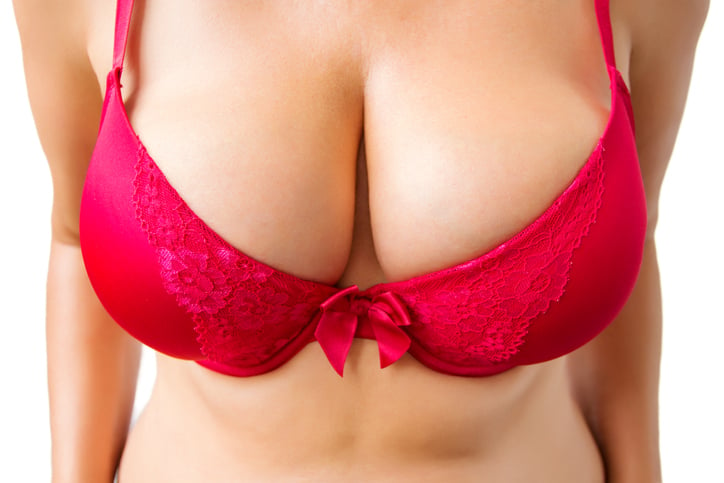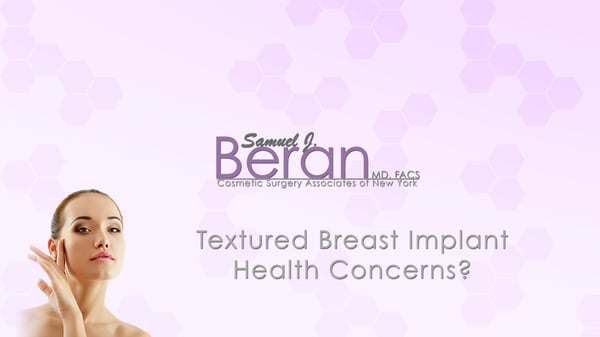
As you may have heard, textured breast implants made by Allergan have been linked to a rare type of cancer and have recently been recalled in the United States and worldwide. The recall concerns Allergan’s BIOCELL textured breast implants and tissue expanders. You can read the FDA announcement about the recall here in the US here.
For an explanation of the recall and what it might mean for you, watch this short video
To help patients better understand this issue, I’ve made a 2½-minute video explaining the details, which you can watch by clicking on the image below.
AN IMPORTANT ANNOUNCEMENT FOR ALL MY PATIENTS: I only use smooth breast implants in my practice, not textured
To reassure all of my patients with breast implants, especially those with textured breast implants and those considering getting breast implants, I want to state very clearly:
I only use smooth implants, not textured ones. Therefore, none of my patients have to worry about the Allergan BIOCELL recall. However, if any of my patients have friends or family members who do have textured implants, such as the tear drop variety, I am happy to meet with them to advise them on what they should do going forward.
If you have breast implants, especially textured ones, you should call your surgeon or come see me for an exam
If you have breast implants — saline, silicone, gummy or textured — it’s important to get them checked for ruptures, slippage, leakage, swelling, the previously-mentioned rare cancer or any other potential problems. For all of my patients with implants, I strongly recommend getting them checked once a year. If you have textured implants (the subject of the Allergan recall), you should act even sooner — get them checked right away.
Symptoms of potential problems include:
- Pain
- Lumps
- swelling
- breast asymmetry
If you are experiencing of these symptoms, consult your plastic surgeon right away. However, if there are no symptoms, there is no reason to remove the implants.
When asked if breast implants are safe, my answer is yes
In over 20 years of performing breast implant surgery in my plastic surgery practice, I have encountered very few complications. In fact, for many women who want larger breasts, or want the size and shape of their breasts to match, or have had a mastectomy and are seeking breast reconstruction, breast implants are a highly satisfying solution. Also, according to the American Society of Plastic Surgeons, breast implant surgery is the top cosmetic surgery performed in the US today.
I offer three types of breast implants, all of them safe
- Silicone breast implants—filled with silicone gel.
- Saline breast implants—filled with saline (sterile saltwater).
- Natrelle® gummy breast implants—filled with silicone gel. Choose from five profiles (low to extra full), four degrees of fullness (minimal to maximum) and three levels of cohesivity (gumminess).
Most women—and most plastic surgeons, myself included—prefer the look and feel of silicone implants rather than saline. Saline implants are more prone to cause rippling of the skin. To learn more about the range of breast augmentation procedures I offer, click here.
5 highly informative blogs explaining the safety of breast implants
So that you can be fully informed on this important subject, I’ve written several blogs explaining the safety of breast implants:
- Are Breast Implants Safe? Yes And Here’s Why
- When Was The Last Time You Had Your Breast Implants Checked?
- Do You Have Textured Breast Implants? Here’s Why You Should Contact Your Surgeon.
- Wondering If Your Breast Implants Are Safe? This Video Explains Why They Are.
- Addressing Recent Reports About The Safety of Textured Breast Implants
Considering breast implants?
If you are thinking about having breast implant surgery and would like to schedule a free consultation, please contact me and I will send you additional information prior to your appointment. During our consultation, I will assess the current appearance of your breasts, your reasons for wanting surgery, and your expectations. Then together, we will decide which breast procedure will bring you the results you’re looking for. I specialize in the most advanced techniques of breast augmentation surgery and am ready to help you achieve your goals.
Learn more about the many breast procedures I offer
You can find a good deal of information on my website about the many breast procedures available to you:
- Breast Procedures
- Breast Augmentation
- Breast Lift
- Breast Reconstruction
- Breast Reduction
- Breast Revision
Board certified by the American Board of Plastic Surgery (ABPS), a member of the American Society of Plastic Surgeons (ASPS) and the American Society for Aesthetic Plastic Surgery (ASAPS), and a Fellow of the American College of Surgeons (FACS), Samuel J. Beran, MD is a highly accomplished plastic surgeon with offices in Manhattan, Harrison and Mount Kisco, NY. With more than 20 years’ experience and a thorough command of the most advanced techniques and technologies, Dr. Beran consistently provides his patients with the highest level of plastic, cosmetic and reconstructive surgery of the breast, face, skin and body. Recently, Dr. Beran was named a “Top Doctor” by RealSelf for his dedication to responding to consumer questions and patient feedback. The “Top Doctor” designation is awarded to less than 10% of the RealSelf physician community.









